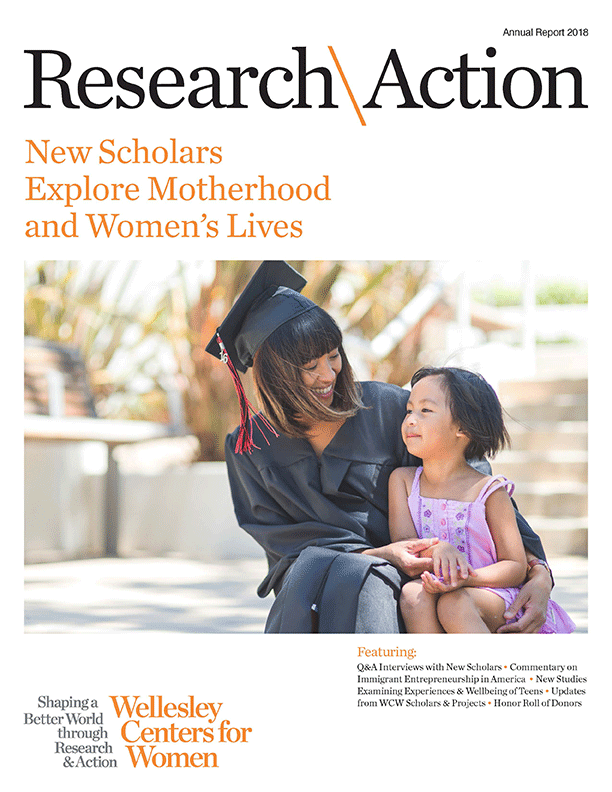The Wellesley Centers for Women (WCW) partnered with The Home for Little Wanderers for the inaugural Women of Color Conference held at Wellesley College in June 2018. This program—geared toward providers who work with at-risk youth and families across the Commonwealth of Massachusetts— highlighted the importance of self-care; offered opportunities for relaxation, renewal, and inspiration; and provided a context in which to view the critical work done on behalf of young women and girls of color. The conference was spearheaded by Joan Wallace- Benjamin, Ph.D., the recently retired president and CEO of The Home, one of the largest service providers in New England dedicated to ensuring the healthy behavioral, emotional, social, and educational development, and physical wellbeing of children and families living in at-risk circumstances.
This fall, Peggy McIntosh, Ph.D., senior research scientist and founder of the National SEED Project, shared perspectives and scholarship on issues of privilege with audiences across the U.S. The College of Design Diversity and Inclusion Council at Georgia Tech invited McIntosh to discuss diversity and inclusion and to facilitate an open discussion with the audience.
Scholars from WCW shared their expertise with Patricia Green, Ph.D., director of the Women’s Bureau, U.S. Department of Labor, during a special May meeting in Boston, MA. At the invitation of Jacqueline Cooke, regional administrator of the Bureau, Layli Maparyan, Ph.D., Katherine Stone Kaufmann ’67 Executive Director, was joined by Nancy Marshall, Ed.D., WCW associate director, and Wendy Wagner Robeson, Ed.D., both WCW senior research scientists from the Work, Families, & Children’s Research Team, and Sari Pekkela Kerr, Ph.D., WCW economist/ senior research scientist, for the roundtable discussion with policy researchers.
Linda Williams, Ph.D., WCW senior research scientist and director of the Justice and Gender-Based Violence Research Initiative, presented with Melissa Morabito, Ph.D., associate professor at University Massachusetts annual report 2018 Lowell (UMass-Lowell), and April Pattavina, Ph.D., WCW senior scholar and professor at UMass-Lowell, “Sexual Assault Case attrition: Key findings from the UML-WCW NIJfunded Research” at the American Society of Criminology (ASC) Annual Meeting
Nan Stein, Ed.D., WCW senior research scientist, and Mina White, M.P.H., from the California Department of Public Health, presented “Expanding the Boundaries of Shifting Boundaries: From Initial Implementation to Innovation” during the National Sexual Assault Conference 2018 held in August in Anaheim, CA. In October, Stein presented “Nipping Sexual Harassment in the Bud” as part of WomenExplore’s series on “Struggles, Strengths, and Strategies” in Cambridge, MA, and provided a training to Smith College, during which she shared details about the effectiveness of Shifting Boundaries, a multi-level gender-violence/harassment prevention programming in middle schools.
Georgia Hall, Ph.D., WCW associate director, senior research scientist, and director of the National Institute on Out-of-School Time, presented at the U.S. Department of Education 21st Century Community Learning Centers Conference for State Education Administrators in July. Hall joined experts from the U.S. Office of Safe and Healthy Students and the Pennsylvania Education Department to present on “Afterschool Program Safety and Health.”
Linda Charmaraman, Ph.D., WCW senior research scientist and director of the Youth, Media, & Wellbeing Research Lab, co-presented a poster with her WCW Class of ’67 Intern Rebecca Leu (Class of 2019) entitled, “Adolescent Social Media Use and Body Image: Associations with depression, social anxiety, and peers,” at the annual meeting of the American Psychological Association (APA) in San Francisco, CA, in August.
This fall, LaShawnda Lindsay, Ph.D., research scientist at the Wellesley Centers for Women, began piloting The Black Girls Create (BGC) Project, a culturally responsive STEM (science, technology, engineering, and math) program that seeks to increase underserved girls’ interest and confidence in science and math. This project builds on the notion that informal learning spaces can provide underserved students with access to quality and culturally relevant STEM activities that are often unavailable in their schools.
The Eunice Kennedy Shriver National Institute of Child Health & Human Development of the National Institutes of Health (NIH) awarded the Wellesley Centers for Women (WCW) $450,000 over three years to study social media use of early adolescents while providing Wellesley College students with hands-on research opportunities. The longitudinal, multi-method study will investigate associations between middle school students’ social media use and health implications, as well as the roles of peer influence and parental monitoring.
The Wellesley Centers for Women (WCW) will partner with the University of Illinois at Chicago on a $7 million, multi-year project to evaluate and compare depression prevention programs for teens. Over $1.6 million of the award from the Patient-Centered Outcomes Research Institute (PCORI) will go to WCW.
Tracy Gladstone, Ph.D., associate director, senior research scientist, and director of the Robert S. and Grace W. Stone Primary Prevention Initiatives at the Wellesley Centers for Women (WCW), co-authored “Effect of Internet-Based Cognitive Behavioral Humanistic and Interpersonal Training vs. Internet-Based General Health Education on Adolescent Depression in Primary Care: A Randomized Clinical Trial.” Gladstone et al., 2018, published the study results in the Journal of American Medical Association (JAMA), highlighting the positive effects of the web-based CATCH-IT intervention on preventing depressive episodes among adolescents most at risk.
Layli Maparyan, Ph.D., Katherine Stone Kaufmann ’67 Executive Director of WCW, authored “Womanism and Black Women’s Health,” a chapter in Meridians: Feminism, Race, Transnationalism (Duke, 2018). Maparyan writes about the spiritual movement of Womanism and the importance of Black women’s healing of self, not just of others. “Black Women,” she writes, “have proven historically and transculturally to be peerless healers across an unbroken thread of time and space. Yet Black women today must first turn our healing gifts upon ourselves.”
Page 1 of 2

In this issue:
 | Wellesley Centers for Women 781.283.2500 |
Copyright © 2026 Wellesley Centers for Women, Wellesley College | Privacy Policy
